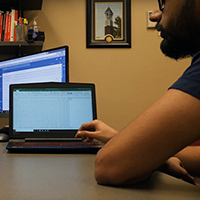
PhD Partners
Doctoral students contribute to research pipeline
A cornerstone of mission is the support and training of talented Krannert doctoral students as they study empirical economic methodologies and apply them to policy evaluation.
It is this rigor — and Purdue’s wide recognition as a premier research institution — that drew Department of Economics PhD candidate Mary Kate Batistich to Krannert.
“I also knew that the department had a strong record of placing their graduates in good jobs, paired with high completion rates,” says Batistich. “The decision to actually come to Purdue wasn't made until I came for a campus visit and was greeted with warmth and sincerity by faculty, staff and students. It simply felt like the right fit.”
Batistich is in her fifth and final year of the program, all funded by PURCE, earning a MS in economics along the way. PURCE has also funded some special opportunities, including attendance at a weeklong conference in Boston.
Another perk that can't be overlooked, she says, is the PURCE suite, which brings together a variety of researchers interested in policy-relevant questions, facilitating collaboration between faculty and graduate students.
“I have been impressed during my time here with the way faculty take the graduate students seriously, and work with us on real projects. The students are also very supportive of each other, and I've made some lifelong friends,” she says.
Batistich works closely with PURCE affiliate Tim Bond, associate professor of economics, who she says has been an excellent guide.
“He keeps a strict standard for producing high quality research, and expects his advisees to do the same,” says Batistich. “We are also fantastic collaborators and are in the final stages of a first co-authored paper.”
Batistich and Bond’s working paper, “Stalled Racial Progress and Japanese Trade in the 1970s and 1980s,” looks at racial disparities in the impact of globalization and, specifically, the momentous wave of import competition the U.S. faced from Japan a few decades ago.
“Our research finds that this shock played an instrumental role in the stalling and reversal of economic progress black Americans had gained through the civil rights era,” Batistich says.
Batistich is interested in labor and international economics, and is researching how technological change and globalization over the past three decades have affected the state of employment in today's U.S. manufacturing sector.
“I am asking whether we should think any differently about a job lost due to import competition versus a job lost due to automation, in terms of policy, and what these differences might mean for the future of work in this sector that once employed nearly one out of every three workers,” she says.
PURCE’s mission is to share research insights with the public in an significant way, and the importance of building this bridge is apparent to Batistich. She has attended many PURCE events, including policy luncheons and the annual Economic Ideas Forum.
“These events are enriching in that they solidify the connection between what we do as economists on a daily basis and what is being discussed more broadly in policy circles and the world at large,” Batistich says. “They are also a great way to interact with donors and the local community.”






